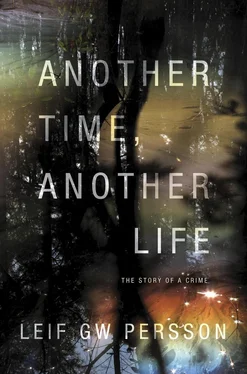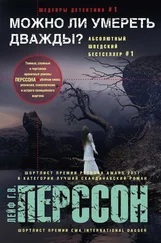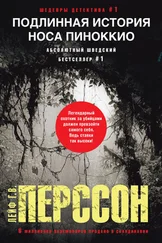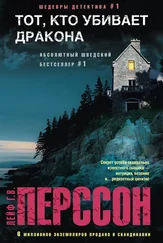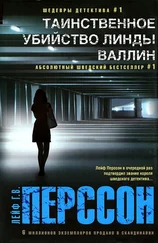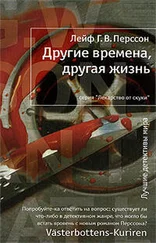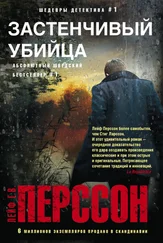“So what are their names?” said Johansson. I’m still a policeman, he thought.
“They’re both dead, actually,” answered Wiklander. “One was a TV journalist who was rather well known in his day — we’re talking the late seventies and eighties. His name was Sten Welander, born in 1947. He died of cancer five years ago.”
“I have a faint memory,” said Johansson. A skinny fanatical type with designer stubble and all the opinions that were correct at the time. They were all like that anyway, regardless of when, he thought.
“The other one worked at the Central Bureau of Statistics over on Karlavägen as some kind of official... assistant director... nothing remarkable... Eriksson, Kjell Göran, born 1944.”
“Died from a stroke of course,” Johansson grunted contentedly.
“No,” said Wiklander. “He was murdered in November 1989.”
“You don’t say,” said Johansson. “You don’t say.” This is getting better and better, he thought with delight.
“Yes,” said Wiklander. “I’ve requested the investigation files from Stockholm. It’s still unsolved, but no one has worked on the case since the spring of 1990. After that it went down into the archives... no investigation results, according to the decision.”
“I have some faint recollection,” said Johansson hesitantly. “Eriksson?” What was that about? he thought.
How had Welander and Eriksson, suitably enough both dead, turned up in the file on the West German embassy, and how was it that it had happened when it did? Hardly six months remained before the case would lapse when the statute of limitations ran out, and without anyone seeming to have lifted a finger to investigate the case for more than twenty years. Of all this, and this was what was so strange, there was not the slightest hint in the files that Wiklander had gone through.
“It must have been Berg who put them in,” said Johansson. “Have you talked with him?”
“No,” said Wiklander. “I thought I would wait until I knew a little more.”
“Smart,” said Johansson. “Find out how they wound up in the file.” If for no other reason than to satisfy our curiosity, he thought.
“Yes... it’s doubtful there will be any indictment against them,” observed Wiklander, who was not particularly interested in jurisprudence either as long as real police work was involved.
Whether Wiklander was only almost as good a police officer as his boss, the legendary Lars Martin Johansson, was actually of no interest, because he was good enough. When the binders on the unsolved murder of Kjell Eriksson on the thirtieth of November 1989 came up from the colleagues in Stockholm, Wiklander closed the door to his office, unplugged the telephone, and, to be on the safe side, turned on the red lightbulb outside his door. Then he set to work.
Before he left for the day he was becoming certain he had figured out how the whole thing fit together, even if he was far from clear about why he felt that. Police intuition, Wiklander thought philosophically, leaning back in his chair to summarize his thoughts before he went home after a long day.
If I try not to make things unnecessarily difficult, thought Wiklander, then the most likely explanation is that both Eriksson and the now deceased TV reporter Welander were two of the four names that had been cleaned out of the registry just over two years ago. But who were the other two?
Personally he was more or less convinced that the broker Tischler must have been one of them, and according to the searches he had already made Tischler was still alive, allowing for the fact that he had left the country ten years ago and was currently registered in Luxembourg. The simple, obvious explanation for Tischler’s generosity toward Eriksson must have been that they had a history together that would not bear scrutiny and that Tischler would fall considerably farther than Eriksson if their common secret was revealed.
That left the fourth one who had disappeared from the registry, thought Wiklander. Who was he, or perhaps even she? Despite everything, women were considerably more common in political terrorism than in traditional serious crime, and that must be the motive in this case, he thought.
One of Eriksson’s neighbors? It didn’t seem particularly likely based on the material he’d found in the investigation. One of his coworkers whom the detectives investigating the murder had missed because they didn’t know what they were looking for? Not at all impossible, thought Wiklander, who as a real policeman had a very strong opinion about university graduates in Eriksson’s generation. Eriksson’s Polish cleaning woman? She was in a good category, thought Wiklander, but the problem with her — he had already checked on his computer — was that she hadn’t come to Sweden until 1978, three years after the events at the West German embassy.
It’ll work out, thought Wiklander. In any event, he had already turned over lists of all the neighbors, coworkers, and everyone else who appeared in the investigation to his colleagues at the group for internal surveillance. By the time he arrived at work the next day the names would have been checked against the secret police’s registry of politically motivated hooligans and of everyone else who just happened to be there. Despite all the truth commissions that the outside world persisted in foisting off on him and his hardworking comrades.
But that wasn’t the question that was really interesting. If someone had gone to the trouble of cleaning out those four names just over two years ago, why had two of them been re-inserted in the same registry only a few months ago, and at a time when the top priority was flushing as many names as possible? And why had Tischler avoided making the same round-trip if he had been in the registry from the start, which most of the investigation suggested that he had? Because Tischler, in contrast to the other two, was still alive? Because he had his own channels to power? Because...
This’ll work itself out too, thought Wiklander, getting up and flexing his computer-stiffened shoulders. As soon as he figured out who the fourth one was, there would be only one completely uninteresting detail remaining, which his colleagues in Stockholm could take care of: who had murdered Kjell Göran Eriksson?
When Wiklander returned to his office the next morning, the lists with the search results were already on his desk. They contained nothing that he had not already figured out or suspected. Only one of the neighbors had produced a hit in SePo’s registry. An old Nazi-tainted major who, granted, lived on the same floor as the murder victim. But the mere thought that he could have had anything politically in common with Eriksson, Tischler, and Welander was preposterous. He couldn’t have murdered Eriksson either, because the Stockholm Police Department’s detectives had given him a better alibi than he really deserved: He had taken part in the celebration of the anniversary of Charles XII’s death on the same evening Eriksson was murdered.
You lucky devil, thought Wiklander, whose political views were different from the major’s.
A check on Eriksson’s former coworkers had produced considerably more hits in the registry. The number was even higher than expected for the office in question, but none of the five individuals whose names came up made Wiklander particularly excited. They had been ordinary members of the far left back then; two were now social democrats, one a liberal, one a conservative, and one a Green; all of them were living in a new era and evidently unworthy even of being rescued from the eyes of the review commission.
Only Eriksson’s Polish cleaning woman remained. Even she had her own file up at SePo. Not because she cleaned but because she was Polish and had apparently been involved with at least seven of Wiklander’s colleagues within the open operation, who also seemed to have in common the fact that their discretion left a good deal to be desired. Nice-looking woman, thought Wiklander, looking appreciatively at the picture of Jolanta that was in her personal file, but just now you leave me cold, he thought, as he closed it.
Читать дальше
